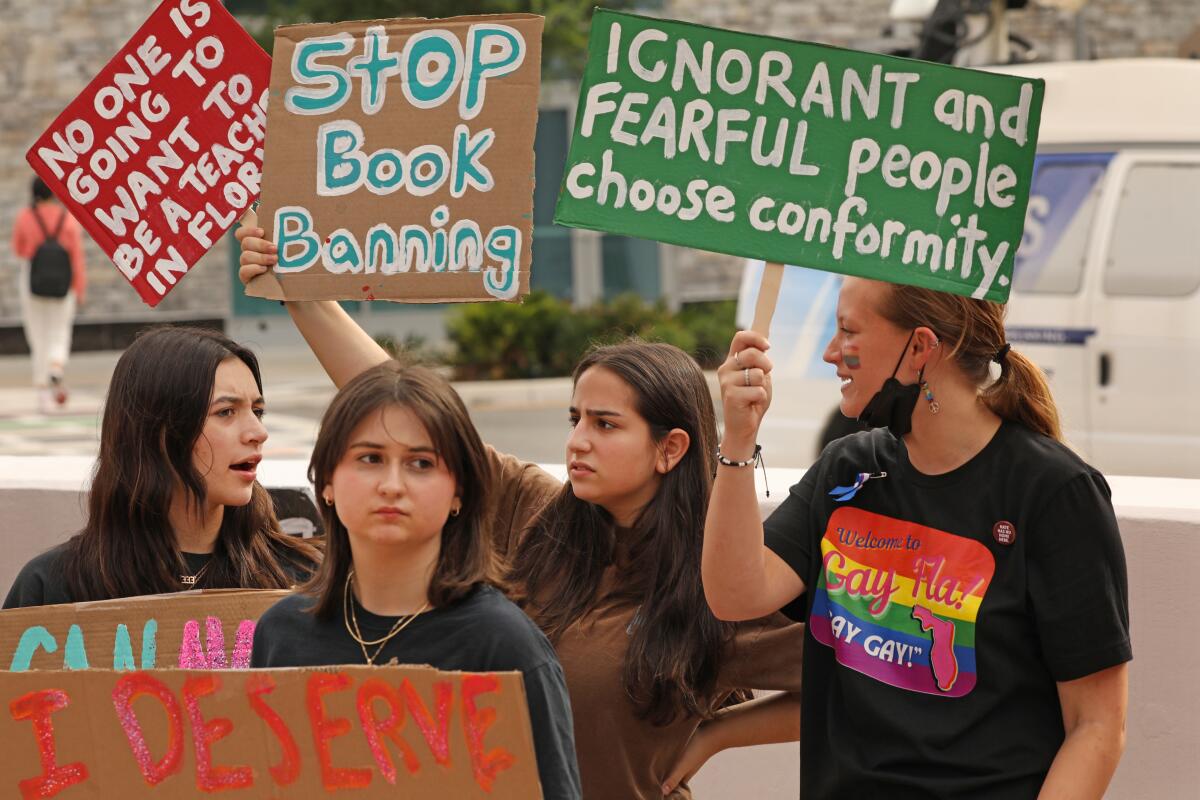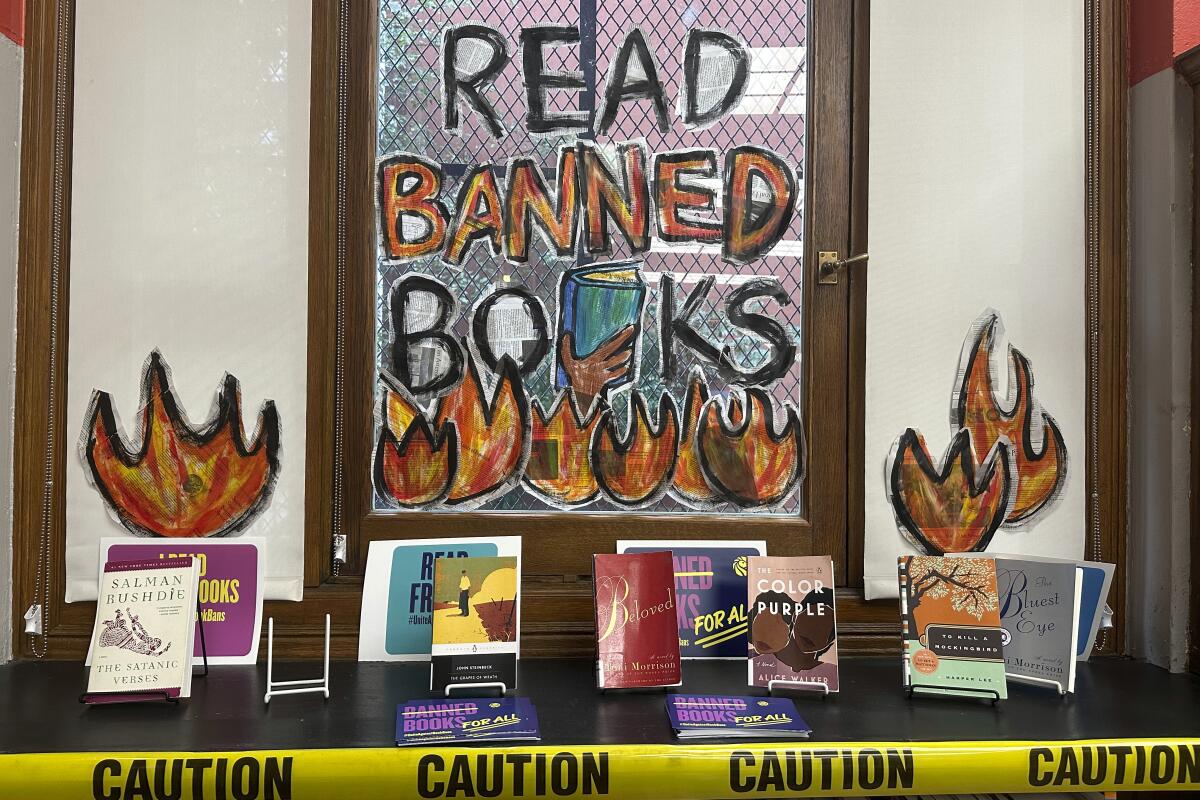Hell hath no fury like a librarian scorned in the book banning wars

- Share via
Amanda Jones is a Louisiana middle-school librarian who sleeps with a shotgun under her bed and carries a pistol when she travels the back roads.
Threats against her began two years ago after she spoke out against censorship and was drawn into the culture wars over book banning. She was condemned as a pedophile and a groomer and accused of “advocating teaching anal sex to 11-year-olds.” The Christian right targeted her, and she found herself in the news warning that conservatives in her state and across much of the country were endangering libraries and intellectual freedom.
“I never expected any of this,” said Jones, who lives in Livingston Parish. “It’s a huge weight to feel all that attention. I’m just a school librarian from a two red-light town.”
Jones’ cautionary and disquieting testament to the nation’s divisiveness is told in her new memoir, “That Librarian: The Fight Against Book Banning in America,” a blunt, angry, searching and redeeming story about a woman engulfed by forces and designs she never imagined. It is a glimpse into a family and a small town that reads like a chapter out of “The Scarlet Letter” or “The Crucible,” narratives whose themes of fear, superstition, rage and religion are again permeating the nation’s political moment, including Republican vice presidential candidate JD Vance’s recent comments that “Democrats want to put sexually explicit books in toddlers’ libraries.”
“Our presidential election will determine how far it goes,” Jones said in an interview. “If Trump is elected, Project 2025 [a 900-plus-page conservative manifesto] will take root. It will ramp up the hate. We’ll see a large flight of educators and librarians from their jobs. Trump’s made it OK for people to hate and attack. I noticed it right after the George Floyd protests. People started saying the quiet part out loud.”
Amid rumors that a Livingston Parish Library board member was questioning the stocking of LGBTQ+ books, Jones stood and spoke against censorship at the July 19, 2022, board meeting. She told the crowd that titles often targeted for banning were about minorities and LGBTQ+ people, or books on sexual health and reproductive rights. She did not mention specific titles, saying that “no one portion of the community should dictate what the rest of the citizens have access to.”

She added that removing or relocating books on LGBTQ+ themes could be harmful to children and young people seeking to understand their identity. “I grew up in this parish being taught that God is love,” she said. “What I’ve come to realize is that what many people mean is that God is love only if you have the same religious and political beliefs as them... no one on the right side of history has ever been on the side of censorship and hiding books.”
The attacks were immediate, fierce and confounding. She was labeled a “sicko, pig, trash,” she writes in the memoir. “The sense of betrayal was overwhelming.” One message was particularly alarming: “Continue with your LGBT agenda on our children cause we gunna put [you] in the dirt very soon ... You can’t hide. We know where you work + live... you have a LARGE target on your back.”
“All I did was make a statement on censorship,” she writes, noting that her comments were made at her parish public library and that she never mentioned her school library, “but people were posting like I was handing out copies of Hustler magazine at my school.”
Jones fell into depression. She said she cried so hard that her eyes swelled shut; she had panic attacks, and her blood pressure spiked. She wondered how to explain the furor to her teenage daughter. She went to a therapist and took a leave of absence from the middle school for a semester. But Jones found it difficult to escape the vitriol aimed at her, including from friends, who, like her, grew up in Christian homes in a town outside Baton Rouge, where kids swam in the creek and the local branch of the library was once “in a room next to a washeteria.”
A growing number of librarians, like Jones, have been targeted nationwide, including Martha Hickson in Annandale, N.J., and another in Michigan who received abusive phone calls and was tagged as a pedophile in signs posted around her town. State legislatures have proposed bills that would hold libraries accountable to obscenity laws and would make it a crime for librarians and educators to stock books containing sexually explicit images.
“That Librarian” is an interrogation of self and a community in a deep red state that in June passed a law requiring that the Ten Commandments be posted in every classroom. The book resonates with a rustic knowingness that coveys the intricacies and suspicions of tightly bound lives. The descendant of slave owners, Jones struggles to understand a history of racism and prejudice that still unsettles the country.

As a white, straight woman, who as a child read Judy Blume — one of America’s most banned authors — to navigate the tricky crosscurrents of youth, Jones said books are a refuge and a map for those wanting to empathize with people different from themselves.
The men instigating the outrage against her, she writes, were Michael Lunsford, executive director of Citizens for a New Louisiana, and Ryan Thames, who runs the Facebook blog Bayou State of Mind. Such organizations, along with Moms for Liberty, which has the support of Florida Gov. Ron DeSantis, and other groups seeking to ban books in school libraries, have pressured local officials and have been at the center of the nation’s cultural wars. Some conservative groups have led campaigns to cut library funding and harass board members.
The American Library Assn. reported that more than 4,200 unique titles were targeted for censorship in 2023, a 65% increase from the previous year. Among the most challenged titles were books on race and sexuality, some with explicit images, including “Gender Queer: A Memoir” by Maia Kobabe and “This Book Is Gay” by Juno Dawson. Classics such as “The Bluest Eye” by Toni Morrison have also been targeted and removed from circulation.
Jones filed a civil suit against Lunsford and Thames. The case was dismissed after the judge ruled that the online statements about Jones were opinions and not defamatory. In an interview, Lunsford said that the suit was frivolous and that “for her to say we damaged her in some way is ridiculous.” He said his organization’s focus is to prevent libraries statewide from allowing children access to what it considers erotic or pornographic materials.
“Nobody is putting pornography in children’s sections of the library,” Jones said in the 2022 meeting in Livingston Parish, where she was raised a Southern Baptist and has been a librarian and teacher for more than 22 years. “Stop that false narrative.”
Thames’ lawyer, Joseph Long, was quoted in the Hill after the dismissal as saying that Jones was part of the “radical left” and couldn’t take “the heat of criticism.” Jones wrote in her memoir that Lunsford, who questioned what kind of influence the librarian would have over children, peddled conspiracy theories and espoused “typical far-right nonsense.” She said Thames, whose blog accused her of advocating teaching anal sex to children, was a man “who hides behind his keyboard.”
“That Librarian” is a raw and disarming exploration of a writer confronting her own anxieties and wrath — one chapter title reads “Hell Hath No Fury Like a Librarian Scorned.” “I was very angry when I was writing,” said Jones, referring to Lunsford and Thames. “I punched away at the keys. This is what your actions have cost me. I know they’re going to read it and listen to the audiobook. This is my way of telling them.”
“I say I have no regrets,” writes Jones, an award-winning former president of the Louisiana Assn. of School Librarians, who during the online bullying against her used an expletive to describe a parish councilman, “but I do have one, and that is the fact that, try as I might, I didn’t always take the high road.”
She has another regret too. She voted for Donald Trump in 2016. “I was,” she writes, “a contributing factor in the growing movement of white nationalism.”

Her family’s conservatism made it difficult at first for her mother to accept the premise of her daughter’s book. “I just can’t finish it,” Jones quotes her mother as saying after she gave her an early copy of “That Librarian.” “She took a fit to the term white Christian nationalist. But she did finish it and she said she was proud of me. But we don’t talk about politics in my family.”
Still, as in many politically divided households across the land, Jones needs answers: “When it comes to my parents,” she writes, “I want to ask them this question: Who exactly is the big bad wolf, or is it a mythical creature created in their own heads based on” what Tucker Carlson once told them on Fox? “I know they don’t think it’s their own child.”
Jones received support from many corners. Oprah Winfrey praised her in a speech at the 2023 National Book Awards: “Amanda Jones started getting death threats, all for standing up for our right to read.” One person wrote: “Stay strong sister.” An educator told her: “You are a brave warrior!” A veteran from New York sent an encouraging note: “A hell of a lot of children need people like you to help them find the hero within themselves...”
Such sentiments, she said, represent a growing push against book banning and censorship as moderate and progressive factions that were slow to mobilize have been winning in recent school board elections. “It’s not just the books,” said Jones, who has stressed that titles should be listed according to age appropriateness. “It’s a larger agenda about what we can read and what’s in our schools. It’s an attack on knowledge. ... But people are starting to realize what’s happening, and they’re starting to fight back.”
Jones co-founded the Livingston Parish Library Alliance, a citizens’ group that supports the local library, and is a founding member of Louisiana Citizens Against Censorship. She started a Facebook support group for others who have been harassed and intimidated in school districts across the country. “I’ve personally had conversations with more than 100 librarians,” she said. “I’ve had them cry on my shoulder.”
Jones has begun a new year at her school library. She is also preparing for a national book tour. Not long ago, she received an advance copy of her memoir. She turned to the ISBN number beyond the title page; she scanned the copyright line. “I’m a librarian. I’m excited about things like that,” she said. “It’s not something I ever dreamed about. To write a book. I just wanted to put it on the record.”
More to Read
The biggest entertainment stories
Get our big stories about Hollywood, film, television, music, arts, culture and more right in your inbox as soon as they publish.
You may occasionally receive promotional content from the Los Angeles Times.











